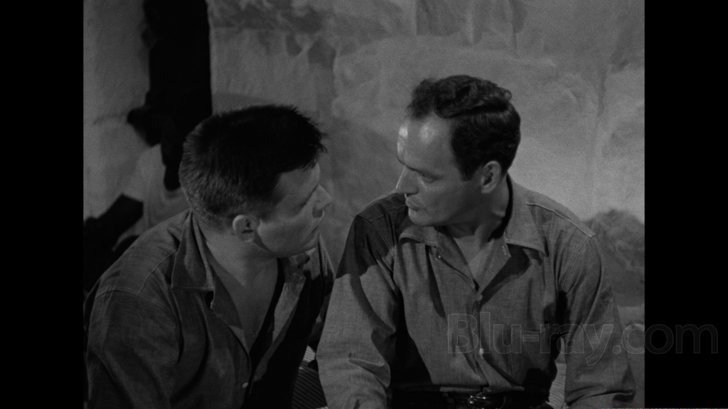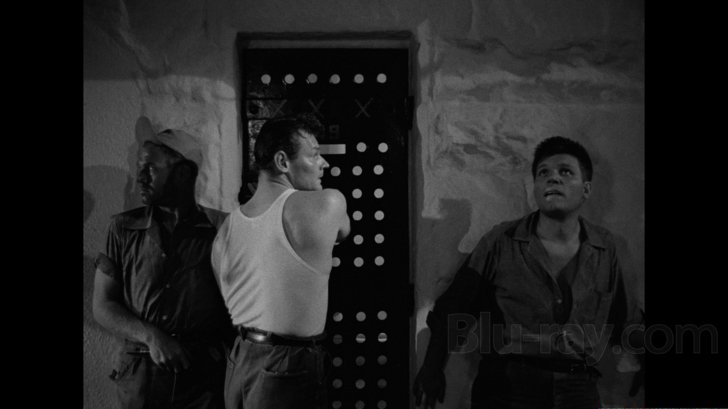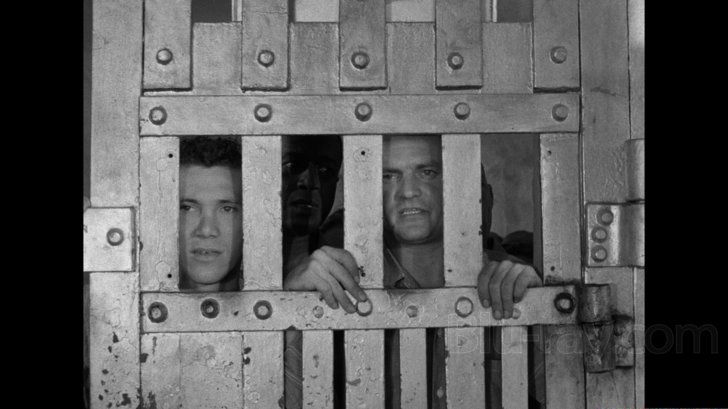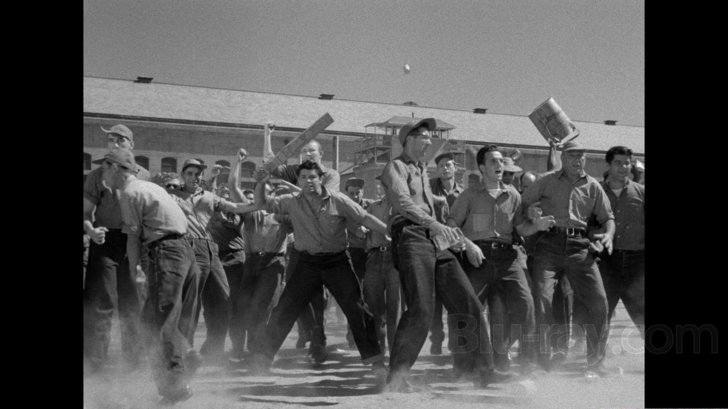Riot in Cell Block 11 Blu-ray Movie
HomeRiot in Cell Block 11 Blu-ray Movie 
Blu-ray + DVDCriterion | 1954 | 81 min | Not rated | Apr 22, 2014

Movie rating
7 | / 10 |
Blu-ray rating
| Users | 5.0 | |
| Reviewer | 4.5 | |
| Overall | 4.6 |
Overview
Riot in Cell Block 11 (1954)
Prison inmates riot to protest crooked guards and brutal conditions.
Starring: Neville Brand, Emile Meyer, Frank Faylen, Leo Gordon, Robert OsterlohDirector: Don Siegel
| Drama | Uncertain |
| Film-Noir | Uncertain |
| Crime | Uncertain |
Specifications
Video
Video codec: MPEG-4 AVC
Video resolution: 1080p
Aspect ratio: 1.37:1
Original aspect ratio: 1.66:1
Audio
English: LPCM Mono (48kHz, 24-bit)
Subtitles
English SDH
Discs
50GB Blu-ray Disc
Two-disc set (1 BD, 1 DVD)
DVD copy
Playback
Region A (locked)
Review
Rating summary
| Movie | 4.5 | |
| Video | 5.0 | |
| Audio | 4.5 | |
| Extras | 4.0 | |
| Overall | 4.5 |
Riot in Cell Block 11 Blu-ray Movie Review
Reviewed by Dr. Svet Atanasov March 28, 2014Don Siegel's "Riot in Cell Block 11" (1954) arrives on Blu-ray courtesy of Criterion. The supplemental features on the disc include an exclusive new audio commentary by film scholar Matthew H. Bernstein; audio excerpts from journalists Peg and Walter McGraw's NBC radio documentary series "The Challenge of Our Prisons"; and excerpts from Stuart Kaminsky's 1974 book "Don Siegel: Director" and the American director's autobiography "A Siegel Film", read by Kristofer Tabori. The release also arrives with an illustrated booklet featuring an essay by critic Chris Fujiwara, a 1954 article by co-producer Walter Wanger, and a 1974 tribute to Don Siegel by filmmaker Sam Peckinpah. In English, with optional English SDH subtitles for the main feature. Region-A "locked".

"I'm for the demands but against the riots."
Don Siegel’s first major hit, Riot in Cell Block 11, was shot on location in Folsom State Prison with real inmates and guards and is about as intense and gritty as it could have been in 1954. It was produced by Walter Wanger (Alfred Hitchcock’s Foreign Correspondent, Joseph L. Mankiewicz's Cleopatra), who spent a few months in prison after he shot a man he suspected of having an affair with his wife, the beautiful actress Joan Bennett. Wanger’s experience was so unsettling that immediately after he was released he decided to produce a film that would make it clear to the public that the American prison system needed serious reforms.
The film opens up with a short prologue in which a commentator announces that a wave of riots has swept American prisons. A high-ranking official then calmly explains that the widespread occurrence of prison riots is the direct result of the shortsighted neglect of the penal institutions. The man also warns that until something is done to correct the situation prison troubles will remain a fact of life.
The action now moves to Folsom State Prison’s overcrowded Cell Block 11, where the inmates are constantly abused by the underpaid guards. Led a by a tough criminal named James Dunn (Neville Brand, Birdman of Alcatraz, The Mad Bomber), a few of them overtake the guards and then demand to see Warden Reynolds (Emile Meyer, Paths of Glory). When Reynolds meets them they ask for better living conditions, end of brutality, and training opportunities that will allow them to quickly find jobs once their prison sentences end.
A large portion of the film is dedicated to the negotiations between Dunn and Reynolds, who does his best to avoid a massive violent confrontation between the inmates and the riot police. This isn’t easy because after commissioner Haskell (Frank Faylen, The Lost Weekend) arrives it immediately becomes obvious that the two have very different ideas how to convince the inmates to go back to their cells.
The situation inside the prison becomes enormously complicated when riots erupt in other cell blocks. Dunn’s right-hand man, Carnie (Leo Gordon, Devil's Angels), also insists that the most brutal guard, Snader (Whit Bissell, Hud), must die regardless of how the authorities respond to the inmates’ demands.
Shot in sixteen days, Riot in Cell Block 11 has the raw quality of a standard documentary feature. Indeed, immediately after Siegel’s camera enters the prison it feels like it tries to capture as much of the chaos as possible without respecting any conventional cinematic rules. Additionally, there is complete lack of interest in glamorizing the men who have to make the important decisions as the drama unfolds. As a result, the film does not have any major heroes.
The majority of the mass scenes are very intense and a few look flat-out dangerous. There is one scene, in particular, where the inmates storm the prison yard and there isn’t a single guard around. The camera is positioned on one of the nearby towers and captures the mayhem from afar. (While watching it, I felt that Siegel and his crew were clearly aware that something really terrible could happen while the inmates were 'acting').
The progression of the events and some key relationships in the film mimic those of a real riot that took place in Michigan’s Jackson State Prison. Important characters in the film, such as James Dunn, Crazy Mike Carnie, Warden Reynolds, and even commissioner Haskell also had real life counterparts whose actions during the riot were well documented.
Note: The great American director Sam Peckinpah was hired as a production assistant on Riot in Cell Block 11. This was his first official job in the film business. Also in 1954, Peckinpah assisted Siegel during the production of Private Hell 36.
Riot in Cell Block 11 Blu-ray Movie, Video Quality 

Presented in an aspect ratio of 1.37:1, encoded with MPEG-4 AVC and granted a 1080p transfer, Don Siegel's Riot in Cell Block 11 arrives on Blu-ray courtesy of Criterion.
The following text appears inside the booklet provided with this Blu-ray release:
"After extensively researching the aspect ratio history of Riot in Cell Block 11, Criterion found that theaters projected the film in aspect ratios ranging from 1.37:1 to 1.85:1. We are presenting the film here in 1.37:1.
This new digital transfer was created in 4K resolution on a DTS Scanity film scanner from the 35mm original camera negative; the film was restored in 2K. Thousands of instances of dirt, debris, scratches, splices, and warps were manually removed using MTI's DRS, while digital vision's Phoenix was used for small dirt, grain, noise management, jitter, and flicker.
The original monaural soundtrack was remastered at 24-bit from a 35mm optical soundtrack negative. Clicks, thumps, hiss, and hum were manually removed using Pro Tools HD. Crackle was attenuated using AudioCube's integrated workstation.
Transfer supervisor: Lee Kline.
Colorist: Sheri Eisenberg/Colorworks, Culver City, CA."
Recently restored in 2K, Don Siegel's gritty prison drama looks impressive in high-definition. The footage from inside the prison is frequently quite dark, but clarity and image depth are excellent (see screencapture #2). Color reproduction is also very convincing - the blacks are lush and solid throughout the entire film while the grays and whites are very well balanced. Furthermore, grain is exceptionally well resolved and evenly distributed. Unsurprisingly, the film has a very smooth (not digitally smoothed) and clean organic look. There are no serious stability issues. The documentary footage used in the prologue has some minor fluctuations, but the shaky transitions and rough spots are indeed inherited. Finally, the encoding and compression are outstanding. (Note: This is a Region-A "locked" Blu-ray release. Therefore, you must have a native Region-A or Region-Free PS3 or SA in order to access its content).
Riot in Cell Block 11 Blu-ray Movie, Audio Quality 

There is only one standard audio track on this Blu-ray release: English LPCM 1.0. For the record, Criterion have provided optional English SDH subtitles for the main feature.
The overall dynamic intensity is limited. Even during the mass scenes where the prisoners clash with the guards dynamic movement is unimpressive, but the lossless track accurately reproduces the film's original sound design. Herschel Burke Gilbert's soundtrack does not have a prominent role in the film. Indeed, it is used primarily during important transitions or to enhance the atmosphere during key events. Clarity and depth are pleasing. The dialog is free of background hiss and crackle. Also, there are no audio dropouts or distortions to report in this review.
Riot in Cell Block 11 Blu-ray Movie, Special Features and Extras 

- Commentary - film scholar Matthew H. Bernstein discusses the production history of Riot in Cell Block 11, the visual style of the film and the narrative's unique qualities that separated it from other similarly themed films produced before 1954, the initial reviews for the film, etc. Indeed, this is a wonderful commentary with plenty of excellent information that makes it extremely easy to appreciate Don Siegel and writer Richard Collins' vision. It was recorded exclusively for Criterion in 2014.
- The Challenge of Our Prisoners - presented here are audio excerpts from journalists Peg and Walter McGraw's NBC radio documentary series The Challenge of Our Prisons originally aired in March 1953. Many of the issues discussed in the series are either identical or similar to the ones addressed in Don Siegel's film. In English, not subtitled. (60 min, 1080p).
- Excerpt From Don Siegel: Director - Kristoffer Tabori, Don Siegel's son, reads excerpts from the chapter on Riot in Cell Block 11 from Stuart Kaminsky's 1974 book Don Siegel: Director, which includes an interview with Neville Brand (who plays the leader of the prisoners, James V. Dunn). Included with the featurette are various production photographs and stills from the film. In English, not subtitled. (13 min, 1080p).
- Don Siegel on Riot in Cell Block 11 - Kristofer Tabori reads a chapter on Riot in Cell Block 11 from the American director's autobiography, A Siegel Film. In English, not subtitled. (26 min, 1080p).
- Booklet - an illustrated booklet featuring an essay by critic Chris Fujiwara, a 1954 article by co-producer Walter Wanger, and a 1974 tribute to Don Siegel by filmmaker Sam Peckinpah.
Riot in Cell Block 11 Blu-ray Movie, Overall Score and Recommendation 

It is easy to understand why Don Siegel's Riot in Cell Block 11 is considered one of the best prison films ever made. Even today, its intensity could be quite intimidating. I liked it a lot. Criterion's new 2K restoration of Riot in Cell Block 11 is beautiful. The Blu-ray also comes with an outstanding audio commentary by film scholar Matthew H. Bernstein. As far as I am concerned, it is one of the very best done for a Criterion release in quite some time. VERY HIGHLY RECOMMENDED.
Similar titles
Similar titles you might also like

Brute Force
1947

Scum
1979

They Live by Night
1948

Animal Factory
Special Edition
2000

Mona Lisa
1986

Le Deuxième Souffle
1966

Underworld
1927

Underworld U.S.A.
Limited Edition to 3000
1961

The Desperate Hours
1955

The Shadow on the Window
1957

Odd Man Out
1947

High Sierra
1941

Raw Deal
Reissue | Special Edition
1948

A Prophet
Un prophète
2009

Big House, U.S.A.
1955

Victims of Sin
Víctimas del pecado
1951

Kiss the Blood Off My Hands
1948

Lady Vengeance
Sympathy for Lady Vengeance | Ultimate Revenge Edition | 친절한 금자씨
2005

Carandiru
Carandirú
2003

The Naked City
1948
